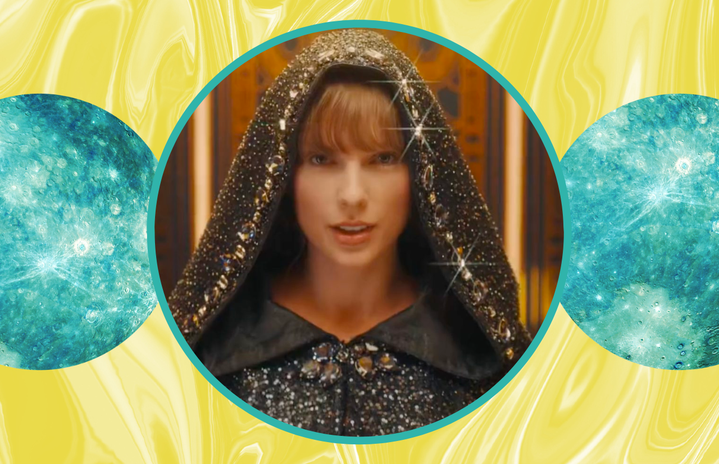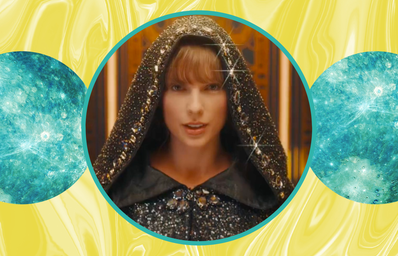Taylor Swift requires no introduction — Billboard’s Artist of the Decade, Nashville’s Songwriter of the Decade, and three-time Album of the Year recipient. Some have gone as far as to call her “The Music Industry.” Swift did not rise to her stature without hard work. Within the past three years alone, she has released five studio albums, a plethora of music videos, a Disney+ documentary concert film, and Netflix’s Miss Americana.
Swift’s newest effort, Midnights, released on October 21st, is a collection of her late-night thoughts, told through glamourous hooks and gloomy lyrics. A culmination of all the styles she’s been implementing since 1989, Swift uses quills, fountain pens, and glitter gel pens to dive deeper than she’s ever gone before, producing her darkest album to date.
Midnights establishes itself as a pop album with the first beat drop of “Lavender Haze.” It shimmers. It sparkles. It’s all things Taylor Swift. The rest of the LP is fused with influences from her retreat to a cabin in the woods with folklore, and the best pop elements of 1989, reputation, and Lover.
“Maroon” has a chorus with a hint of sonic homage to “Cruel Summer,” one of Swift’s most popular tracks. “Anti-Hero” is the radio-hit standout from Midnights, mixing synth-beats with poignant lyrics — “did you hear my covert narcissism / I disguise as altruism / like some kind of congressman?”
“Snow On The Beach” featuring Lana Del Ray encapsulates the calmness of the first snowfall of the year. Lana Del Ray’s distant harmonies float nicely in the background, but if she weren’t listed in the song’s credits, her vocals would be easy to miss. The duet is a slight letdown due to the tour-de-force duo listed in its credits.
In Swift’s fanbase, it’s common knowledge that an album’s fifth song is the most vulnerable — see Lover’s “The Archer” and RED’s “All Too Well.” “You’re On Your Own, Kid” is Swift’s most heart-wrenching entry yet. Loneliness is ripe, particularly in lines, “I picked the petals / he loves me not” and “I hosted parties and starved my body / like I’d be saved by a perfect kiss.” The song includes the greatest facets of Swift’s songwriting, with Jack Antonoff’s laid-back production that builds into an explosion for an alt-pop bridge.
Swift continues the exploration of failed love stories with “Midnight Rain” and “Question…?”. The black-tie revenge theme “Vigilante Shit” sounds like it came from the vault of reputation. Taylor’s vocals are isolated with simple production of reverberating synthesizers, a slight cause for annoyance as the song never quite climaxes to a sonically-satisfying moment.
The end of the album ties together many elements of Taylor’s versatility into four songs. “Bejewelled” has the dance-at-the-club vibe of Lover, while “Labyrinth” is dazzlingly reminiscent of folklore’s “epiphany.” “Karma” jumps back to the catchy drums of 1989, and is certain to become a stadium concert favourite.
“Sweet Nothing” as a soft piano and brass-driven song is an homage to the folk genre, and an album standout for its storytelling lines: “on the way home / I wrote a poem / you say ‘what a mind’ / this happens all the time.” “Mastermind” closes the album with Swift confessing that she’s always been scheming in the back of her mind, which has translated into her love life.
Midnights exposes Taylor as being full of fear, love, revenge, and anxiety. But her fans know that she’s also full of surprises. Three hours after the album release, Taylor unveiled Midnights (3AM Edition), packed with seven new songs.
The National’s Aaron Dessner listed as a writer and producer on “The Great War” and “High Infidelity” contribute to the tracks being effective mixes of folkloric and pop-girl Taylor. The former has a sound akin to Miss Americana’s “Only The Young” accompanied with lyrical tension: “All that bloodshed, crimson clover / uh-huh, sweet dream was over / my hand was the one you reached for.”
The bonus tracks are the biggest indicators of Swift’s versatility. “Bigger Than The Whole Sky” has a dreamily-floating effect. In contrast, “Glitch” is sadly forgettable, with a disjointed sound that cannot be saved by its sweet telling of a friendship-turned-romance. The pop mantra “Paris” is about the beauty of falling in love behind closed doors —“romance is not dead if you keep it just yours.”
“Would’ve, Could’ve, Should’ve” is the crowning jewel of the entire album, jam-packed with lyrics of being taken advantage of in a relationship. Swift sounds menacing and angry in the verses before digging into her younger self as she belts the climax of the song, “living for the thrill of hitting you where it hurts / give me back my girlhood it was mine first.” The most powerful and vivid track on Midnights, Swift defends her title as the queen of breakup songs.
“Dear Reader” closes the LP with lyrics of life advice. But Swift cheekily recognizes that she may not be the best bearer of guidance — “never take advice from someone who’s falling apart.” “Dear Reader” ends a 20-song journey with a flare of self-loathing and doubt.
Make no mistake, Midnights (3AM Edition) is brimming with romance, growth, and revenge, all told with melodic hooks. But that’s not enough to keep you up at night, so Swift ties in tracks of infidelity, broken hearts, and insecurities. It evokes the same feeling as rooftop stargazing and 3:00 AM diary entries. While some may find it an adjustment after the campfire strums of evermore, Midnights reminds the world that Taylor Swift is a pop singer to her core, with the unique ability to hide thoughtful lyrics in catchy melodies.




